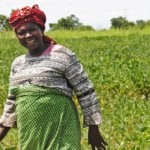WEAI is a first-of-its-kind tool measuring the roles and extent of women’s empowerment in agriculture relative to men within their households, particularly women’s control over critical parts of their lives. It also helps in identifying the women who are disempowered and what areas they are disempowered in, information that is instrumental in designing solutions to close the empowerment gap.
IFPRI and FAO Addressing Gender Inequalities through Agricultural Policies
Traditionally, agricultural development and research tended to ignore gender, which contributed to the marginalization of women and missed opportunities to reduce poverty. Recognizing International Food Policy Research Institute’s (IFPRI) leadership on gender and agriculture, The Food and Agriculture Organization of the United Nations (FAO) called on IFPRI in the late 2000s to collaborate on projects >> Read more
Highlights of Recent IFPRI Research and Partnerships in Bangladesh
This brochure highlights some of IFPRI’s major projects in Bangladesh during the past few decades and describes major new initiatives with the potential to positively influence food and nutrition security policies that benefit the poorest. Bangladesh has made enormous progress in food and nutrition security, food production, market development, employment growth, and social protection programs >> Read more
WEAI: Making Development Programs Inclusive
Since its launch in 2012, WEAI has been revolutionizing how women’s empowerment and role in agriculture are seen and measured. WEAI also proved to be very valuable to other organizations’ monitoring and evaluation efforts.
The Exponential Effects of Empowering Teenage Girls
On July 11, 2016, the international community will observe World Population Day, and this year’s theme is “Investing in teenage girls.” Within IFPRI's gender research, IFPRI helped strengthened the evidence to promote cutting-edge interventions and investments in adolescent girls.
Gates Foundation: Supporting Trailblazing Research to End Hunger and Undernutrition
Ending hunger and undernutrition are critical to poverty reduction. In order to achieve these goals, policymakers and stakeholders must look to agriculture.





